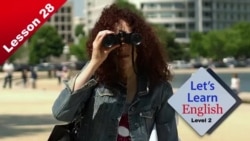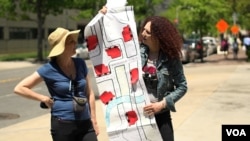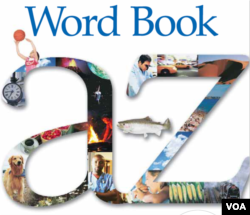Summary
Anna looks for birds but finds ice cream trucks. And then she finds...a spy? But, what is he hiding?
Conversation
KELLY: Oh, Anna, there you are! I am so glad we joined the Great City Bird Count! Aren't you?
ANNA: No. Today has been a bust … a flop … a bummer!
KELLY: I’m sensing a little disappointment.
ANNA: A little?
KELLY: My official bird-watching form is almost full!
ANNA: I've only seen pigeons ... lots and lots of pigeons! But I did write down some other valuable information.
KELLY: Did you find a bird's nest?!
ANNA: No.
(She shows Kelly a map of ice cream trucks.)
ANNA: I found 10 ice cream trucks in this five-block area. Their music seems to follow me everywhere.
KELLY: We're supposed to be counting birds, not ice cream trucks. This is important scientific work!
ANNA: Well, when you want ice cream, my data will be pretty important.
KELLY: Anna, birds are everywhere! I’m sure you’ll find something. Use your imagination! But, make sure that you put it on the official form.
(Anna walks away with her ice cream truck map.)
PROF. BOT: Anna was supposed to find birds, but she didn’t.
PROF. BOT: Kelly says, “We're supposed to be counting birds, not ice cream trucks.” To be supposed to means you are expected to do something.
PROF. BOT: It’s different from have to and ought to. Have to means you must do something. And ought to means you should do it but you don’t have to.
PROF. BOT: Keep watching for have to and ought to!
(Anna looks through binoculars but doesn't see birds. She talks to herself.)
ANNA: No birds. Oh wait, there’s another ice cream truck! Anna, focus on birds. Aw, but that truck has my favorite flavor ... banana!
ANNA: That man is in the way. I can’t see the price. I wonder what flavor he's getting.
ANNA: Strawberry? He doesn't seem like a strawberry kind of guy.
ANNA: In fact, he doesn't seem like an ice cream truck kind of guy. That suit looks expensive.
ANNA: Maybe he's a spy! You know what that means: The ice cream truck driver is a spy, too!
ANNA: Genius! It’s a perfect disguise.
ANNA: What?! The man in the suit left his briefcase at the ice cream truck!
ANNA: I was right! He is a spy! And, he just dropped off top-secret information! I ought to do something. Something needs to be done! I need to do something.
(Anna runs to the ice cream truck and takes the briefcase.)
ANNA: I did it! I took the spy’s briefcase!
ANNA: What’s that?! The ice cream truck -- it’s following me! It wants the case back! I have to hide.
(She runs and hides behind a tree.)
ANNA: This is my life now -- running, scared, alone.
(She runs to another tree.)
ANNA: That awful music -- it’s following me everywhere!
(The man sees her at the tree.)
MAN: Hey! You found my briefcase.
ANNA: You caught me! I mean, I caught you!
MAN: Well, I just want my briefcase. All my poems are in there.
ANNA: Poems? You’re a poet?
MAN: Well, I'm a lawyer. But I write poems, too.
(Anna gives the man his briefcase.)
ANNA: So, you’re not a spy?
MAN: You look disappointed.
ANNA: No, that’s okay. It’s not your fault. Poems are nice, too. I guess.
MAN: Well, would you like me to read my latest one?
ANNA: Why not?
MAN: On sunny day walks, my hand reaches for ice cream from fragaria.
ANNA: I love your poem!
MAN: I love ice cream.
ANNA: Me too.
MAN: What's your favorite flavor?
ANNA: Banana.
MAN: Well, my favorite flavor is ...
ANNA: Strawberry!
MAN: How did you know that?
ANNA: A little bird told me.
New Words
binoculars – n. a device that you hold up to your eyes and look through to see things that are far away
bird – n. an animal that has wings and is covered with feathers
block – n. an area of land surrounded by four streets in a city
briefcase – n. a flat case that is used for carrying papers or books
data – n. facts or information used usually to calculate, analyze, or plan something
disguise – n. made to look like something else
drop off – phrasal verb. to take someone or something to a place and then leave
fragaria – n. a flowering plant that bears strawberries
genius – adj. in a way that uses remarkable talent or intelligence
guy – n. a man (informal)
imagination – n. the ability to form a picture in your mind of something that you have not seen or experienced
in the way – expression. making it more difficult for a person to do something
lawyer – n. a person whose job is to guide and assist people in matters relating to the law
A little bird told me – expression. a way of saying that you do not want to reveal who told you something.
nest – n. the place where a bird lays its eggs and takes care of its young
official – adj. permitted, accepted, or approved by a person or organization that has authority
pigeon – n. a gray bird that is common in cities and that has a fat body and short legs
price – n. the amount of money that you pay for something or that something costs
reach – v. to be able to touch, pick up, or grab something by moving or stretching
sense – v. to understand or be aware of (something) without being told about it or having evidence that it is true
strawberry – n. a soft, juicy red fruit that grows on a low plant with white flowers
top-secret – adj. kept completely secret by high government officials
valuable – adj. very useful or helpful
Why not? – expression. used to make a suggestion, or agree to a suggestion
Grammar
In past Let's Learn English lessons, you learned about the modal verbs have to and ought to. Today, you learned be supposed to. English learners sometimes confuse them:
Be supposed to means to be expected to do something. But, sometimes we use it to say what someone is allowed to do.
Examples:
- “We're supposed to be counting birds, not ice cream trucks.” -Kelly
- I am supposed to meet someone for lunch at noon.
- They were not supposed to stay in the store after it closed.
Have to has the same meaning as must. In American English, have to is much more common than must.
Examples:
- “I have to hide!” -Anna
- We have to leave by 9am to catch the tour.
- What time do you have to be at work?
Ought to has the same meaning as should. But, it is less common and more formal. Sometimes, it is used for saying what is probable.
Examples:
- “I ought to hide!” -Anna
- You ought to visit us for the holiday.
- The show ought to be done in an hour.
|
Modal |
Form |
|
be supposed to |
am/is/are/was/were + supposed to |
|
have to |
have to + simple verb |
|
ought to |
ought to + simple verb |
Expressing Disappointment
In friendly situations, we sometimes use informal language to show disappointment.
For example, Anna says, "Today has been a bust...a flop...a bummer!"
Bust, flop, and bummer are three informal words that show disappointment. Bust and flop mean a complete failure. A bummer is something unpleasant or disappointing.
Examples:
- I lost my phone. What a bummer!
- Last night's event was a real bust.
- The film was so boring. It was a flop.
Sometimes, we can tell a person nicely that they did not cause the disappointment.
For example, Anna learns that the man with the briefcase is not a spy. She is disappointed, but says: "No, that’s okay. It’s not your fault."
Writing Practice
Now, you try it!
1. Write about something that should or must happen soon in your life or in your city or town. Use be supposed to, have to and ought to.
2. What is something that you or someone else has felt disappointed about? Write a few sentences about it. Use language from today's lesson to show disappointment.
Or, just tell us what you think of the lesson. We'd love to hear from you! Write to us in the comments section below.
Review
In today's lesson, you saw examples of grammar from past lessons. Look for sentences in Lesson 28 with:
- passive voice
- present perfect
- adverb clauses
- the verb tell
Write your findings in the comments section.
Listening Quiz
See how well you understand this lesson by taking a listening quiz. Play each short video, then choose the best answer.
Free Materials
Download the VOA Learning English Word Book for a dictionary of the words we use on this website.
For Teachers
Send us an email if you have comments on this course or questions.
Grammar focus: be supposed to, have to and ought to
Topics: expressing disappointment
Comments
Let us know what you think about this lesson. Send us an email or write to us in the Comments section below or on our Facebook page.








